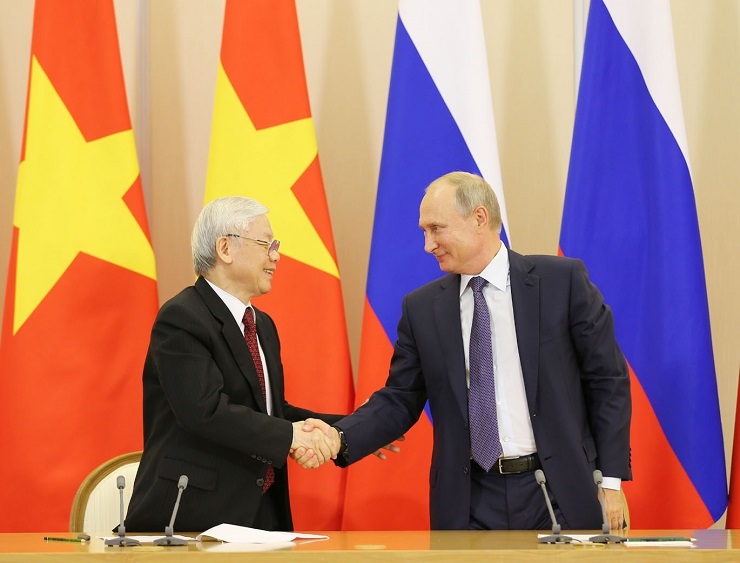Given Russia’s significant shift eastward, news of new cooperation with Vietnam and other southeast Asian nations bears watching. President Putin’s recent call with General Secretary of the Communist Party of Vietnam Nguyen Phu Trong over Sputnik V shipments highlights moves by Moscow to engage the region.
Vietnam began vaccinating citizens using the AstraZeneca vaccine. The second registered vaccine is Sputnik V. The initial batch was just handed over by Russian Security Council Secretary Nikolai Patrushev to Vietnam for free. But vaccines are not the only new cooperation signaling closer Moscow-Hanoi relations. Russian Prime Minister Mikhail Mishustin only recently announced so-called multifaceted initiatives aimed at creating a closer strategic partnership.
Moscow is now forging forward with bilateral cooperation between the two countries on trade, economically and investment-wise. A good example is a recent move for cooperation between Vietnam and Russia in artificial intelligence (AI). A recent online conference organized by Vietnam Software & IT services (VINASA), Russoft, and other vested interests focused on leading-edge AI technologies to discuss the future.
Another critical aspect of this Russia-Hanoi synergy is the apparent uptick in policy leveraging from Washington in the region. The west is trying desperately to counter China, and particularly in the South China Sea, and Hanoi plays a vital role in this. This becomes apparent reading the narrative from sources like Rand Corporation, where political scientist Bonny Lin used Vietnam’s play to dampen China’s response on the issue using a Russian oil rig as a chip. But these kinds of moves to appease the west seem to be fewer in numbers recently, which could indicate a more significant shift. Experts say Vietnam’s “mediation diplomacy,” if this is indeed their hand, may fall apart over the Myanmar test.
Vietnam has done a stellar job of taking advantage of being the chair of ASEAN and its new UN Security Council seat. Regional and world attention is now focused on Hanoi’s every move. But, the Code of Conduct for the South China Sea issue Vietnam leads the discussion on will not be the long-term policy point past 2022. Western think tank narratives try to pit Vietnam against China for obvious reasons. But the long term will see the dominance of the Chinese regionally expand. It’s a bit comedic how outlets like Voice of America try to dictate Vietnamese policy and intentions. This story, headlined “Vietnam Advancing Ties With Russia to Hedge Against China, US,” says what the US State Department wants everyone to think if that is not obvious.
Russia is not bartering arms and oil for clout, as VOA summarily insists. Hanoi is seeking a much more comprehensive pact with Moscow than western analysts and policymakers let on. This report via Phnom Penh Post relays Mr. Putin’s conversation with General Secretary Nguyen Phu Trong, which covered specific measures to foster their cooperation in security, defense, energy, oil and gas, economy, trade, education, training, and tourism. At the end of their talk, the Vietnamese party chief invited President Putin to officially visit Vietnam to attend the closing ceremony of the Vietnam Year in Russia and the Russia Year in Vietnam. Putin accepted the invitation, naturally.
Finally, all over Vietnam news, we find reports of Russia-Vietnam mutual trade strategies for agricultural products with export potentialities like meat, wheat, fertilizer, milk in the Russian market. At the same time, business and political sources tell of Vietnam exporting seafood, coffee, tea, black pepper, fruit, rubber, etc. in the Vietnamese market. So, one has to moderate the narratives coming from US State Department and western corporate media, versus the more logical and meaningful discussions, talked about in Russia or Vietnam. Only in this way, does the big shift in the Southeast Asia region come fulling into view.
Phil Butler, is a policy investigator and analyst, a political scientist and expert on Eastern Europe, he’s an author of the recent bestseller “Putin’s Praetorians” and other books. He writes exclusively for the online magazine “New Eastern Outlook.”

